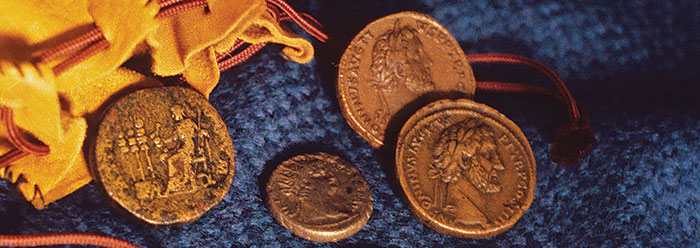Most of us are aware that the Lord Jesus Christ was the greatest gift ever given to humanity. This is the season when we remember His incarnation and sacrifice and wonder at the salvation made possible by that gift. Those of us who have been twice born are especially touched during this time of honoring God’s gift to us, and we try, in our own small ways, to express some recognition of that incomparable act by giving tokens of our love to friends and family. Many of us also try to give some extra gifts to our church and to the Christian organizations we have grown to respect as well. (Please accept our thanks, by the way, for those of you who have shared with ICR over the years.)
But I wanted to challenge you to see gifting from a different perspective this season. To begin with, godly gifting is not giving in such a way that seeks the recognition of other men. Jesus made that perfectly clear:
“Take heed that you do not do your charitable deeds before men, to be seen by them. Otherwise you have no reward from your Father in heaven. Therefore, when you do a charitable deed, do not sound a trumpet before you as the hypocrites do in the synagogues and in the streets, that they may have glory from men. Assuredly, I say to you, they have their reward. But when you do a charitable deed, do not let your left hand know what your right hand is doing, that your charitable deed may be in secret; and your Father who sees in secret will Himself reward you openly.” (Matthew 6:1-4)
Unfortunately, contributing openly is often the easiest way to give. We are all approached for various causes, and it seems like the standard motivational pitch promises some form of special recognition—perhaps being honored as part of an inner circle or given a permanent plaque on the wall. Please don’t misunderstand me, most organizations offering such motivations are doing so in good faith, and many who are motivated by those enticements are not doing wrong—but they just may be missing out on a much greater reward.
Think with me a minute about the gift the Lord Jesus gave at the request of the Father. Jesus had nothing to gain for Himself except the “joy that was set before Him” (Hebrews 12:2). In order to “gift” Himself, He had to empty Himself (Philippians 2:7) and allow Himself to become flesh (John 1:14) and then endure the horrors of crucifixion—not to mention the unspeakable dread of becoming “sin for us” (2 Corinthians 5:21). No, there was nothing in this world for Him to gain from His gift except the certain knowledge that His loving act would bring “many sons to glory” (Hebrews 2:10).
And here’s another thought. No gift is given without the agreement and participation of others—even the priceless gift of the Lord Jesus. The heavenly Father had to give His “only begotten son” (John 3:16). The sweet virgin Mary had to yield herself to God in an uncertain and unknown way, and endure the gossip and disdain of many for the rest of her life. And gentle Joseph, a good man, caught within a hyper-spiritual and political culture that knew almost nothing of God’s grace, was willing to cover over what he initially thought was infidelity on Mary’s part until he was given the truth directly from Gabriel. Then, he married and protected her, and he restrained himself until the Lord Jesus was born. Even Gabriel was caught up in this gift since he was the messenger to the human agents. No gift is given without others being involved.
Then there were the shepherds, Simeon, Anna, Elizabeth, John the Baptist, and the disciples—a godly gift continues to work in the lives of others. This, the greatest gift, really never ceases to give.
Do you remember the poor widow who placed her last penny into the treasury? She was surrounded by crowds that were showing off their wealth, dropping their gold and silver into the big treasury box lying at the feet of the pompous priests ensconced in their liturgical robes and weighed down with the jewelry of religious paraphernalia for all to “ooh and aah” over. One by one, the givers came, slowly strutting up to the dais to trickle their coins into the chest.
Jesus and His disciples watched, witnessing the show of spirituality as the givers received the acknowledgments from the clerics. Then, sliding quietly out of the crowd, the widowed woman came. It is likely the crowd didn’t even notice her, but if they did they would probably only have been annoyed that she got in the way of the parade of celebrities. I suspect she quietly bowed her head as she slipped her two little pennies into the big box.
Those tiny bronze coins didn’t make much noise. No one turned to look. She was the only one nearby with a sincere smile on her face—except for Jesus. He called His disciples over to Him and said:
“Assuredly, I say to you that this poor widow has put in more than all those who have given to the treasury; for they all put in out of their abundance, but she out of her poverty put in all that she had, her whole livelihood.” (Mark 12:43-44)
And herein is the gifting principle of Scripture. The actual dollar value is of no consequence. God’s measure is what it costs the giver. That’s the basic reason why the biblical standard of giving is the tithe. That 10 percent is a measure that reaches across all amounts of value, from the poorest to the wealthiest. Gifting is a heart matter—and the focus of the heart is what brings about the return on the gift. If the heart seeks to please people, then it is from people that we will receive our recognition and reward. Oh yes, there are times when our genuine love for someone prompts us to give money, time, assistance, or ourselves in service because we love them and want to help them. But that kind of gift doesn’t want a return from the one we serve. We give—with no thought of reward—simply because we love!
Just so, the Lord Jesus gave Himself for us! He gifted all He had to give so that we could live in righteousness forever. That widow gifted all she had because she loved the Kingdom and totally trusted that her loving God would take care of her forever. Would to God something of that kind of gifting would permeate our hearts. Then the Holy Spirit could prompt us to give to the right places at the right times with the right amounts.
King David penned a passionate poem about the purpose for giving.
We will not hide them from their children,
shewing to the generation to come the praises of the Lord,
and his strength, and his wonderful works that he hath done.
…that they should make them known to their children:
That the generation to come might know them, even the
children which should be born; who should arise and declare
them to their children: That they might set their hope in God,
and not forget the works of God…
(Psalm 78:4-7)
The works of God need to be transmitted down through the ages to all generations! It’s not enough merely to remember them yourself. It isn’t sufficient to designate a repository for ancient stories to be housed. Nor is it enough to swap stories among friends about “the way it used to be.” Even though the fathers did not do right, we are responsible to make sure the generation to come knows the truth—even the children “who would be born” need to have their “hope in God, and not forget the works of God, but keep His commandments” (Psalm 78:6-7).
How is that going to happen unless God’s people assume the responsibility of gifting toward the future? We must focus on legacy tools that will last far beyond our short lifetimes and reach into the coming generations. Buildings, properties, and museums have a place among those tools. But this is the biblical perspective that must be understood: Godly gifting is heart gifting. That’s exactly why Jesus said:
“Do not lay up for yourselves treasures on earth, where moth and rust destroy and where thieves break in and steal; but lay up for yourselves treasures in heaven, where neither moth nor rust destroys and where thieves do not break in and steal. For where your treasure is, there your heart will be also.” (Matthew 6:19-21)
* Dr. Morris is Chief Executive Officer of the Institute for Creation Research.






















